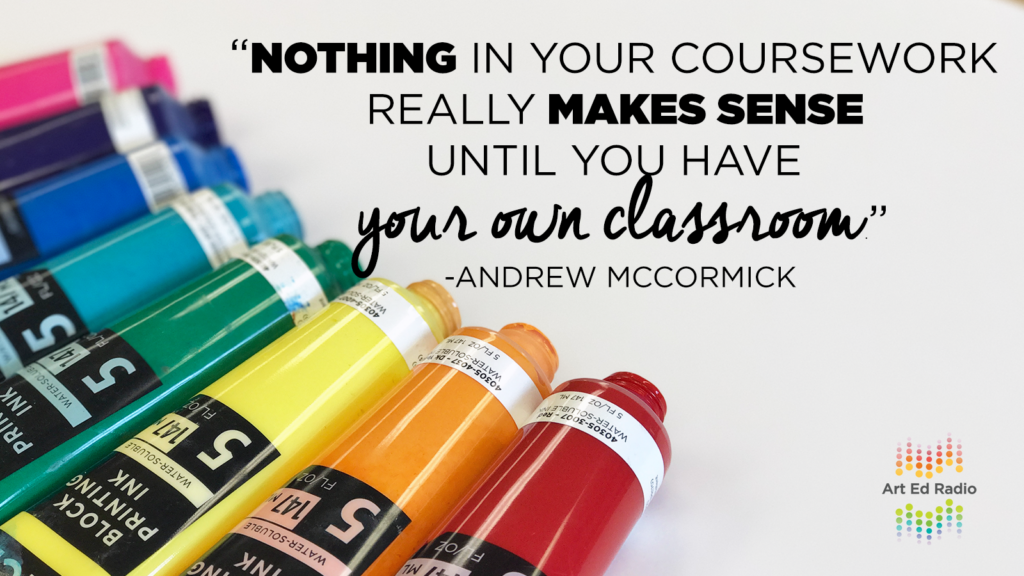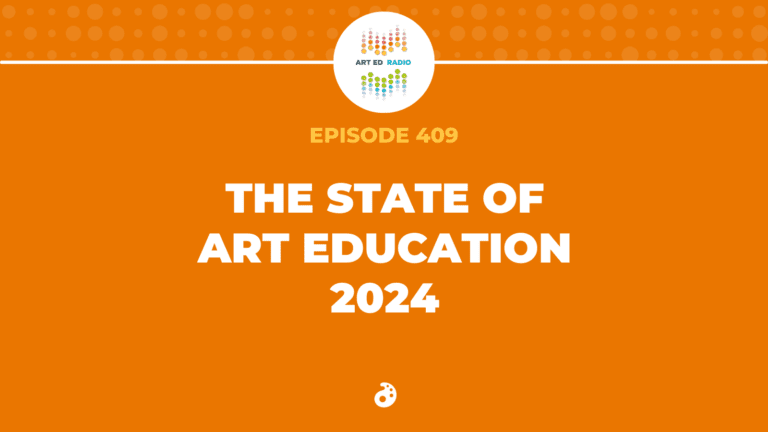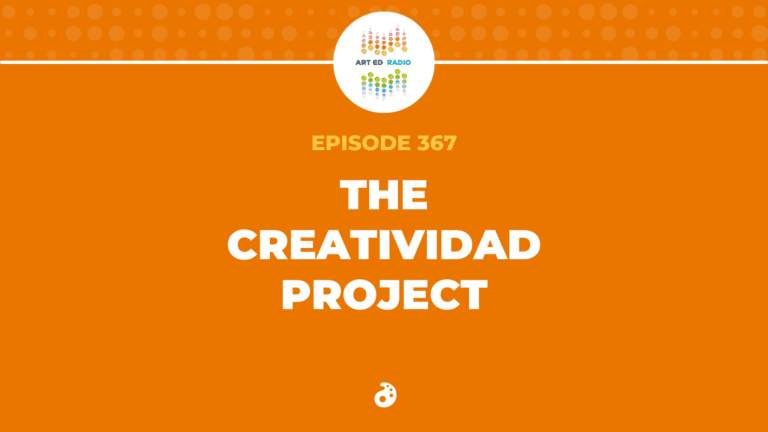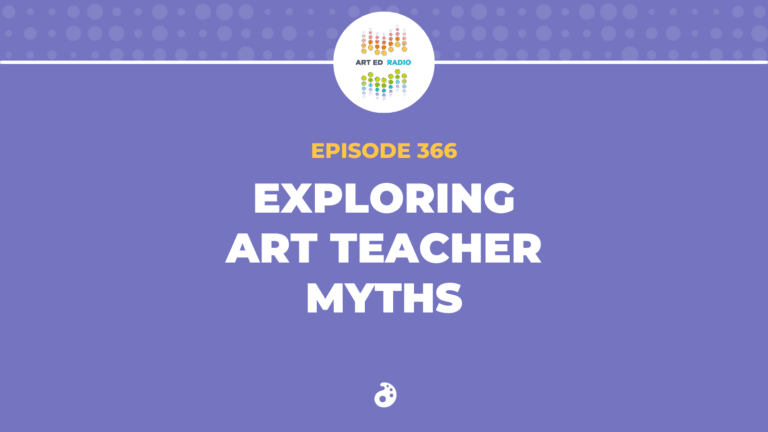Andrew and Tim get together to talk about the reasons that teachers aren’t coming into the profession with everything they need to know. Is it because there is too much involved in the life of an art teacher? Or is the teaching profession just that difficult? Join the guys as they talk about why undergrad coursework can’t possibly cover everything (7:15), the essential education courses that new teachers need (15:45), and what we can do in the real world for teachers that are lacking in the knowledge they need (21:00). Full episode transcript below.
Resources and Links:
- Here is the sculpture podcast that Tim mentioned
- Important advice for entering a new teaching position
- What do student teachers really need?
- What undergrad Art Ed programs forget to teach you

Transcript
Welcome to Art Ed Radio, the podcast for art teachers. This show is produced by the Art of Education and I’m your host, Tim Bogatz. A while back, I think it was when Andrew and I were talking about sculpture, I mentioned that I was able to go through all of undergrad without taking a single three-dimensional art course, no ceramics, no sculpture, nothing, and I know for a fact that I’m not alone. So many art teachers come into the classroom lacking basic knowledge on so much of what we do in the classroom, and that’s going to be my first question for Andrew when he comes on, but let me set the scene a little bit more.
Now, admittedly our jobs involve a lot, and it may not even be feasible to expect that a new art teacher coming into the profession is going to know everything that they should know or will know when they first start out because to me, teaching is and always should be a learning experience, but I think there are far too many teachers with far too little practical knowledge about what it takes to be a successful art teacher, and I think that’s what we need to fix. So, let’s look at it this way. What do the best undergrad programs do? I think they need to be sending undergrads into an actual classroom early and often. One of my most valuable experiences when it comes to teaching was in my sophomore year. I had a practicum at an alternative school. It was an awesome experience that really showed me how much I was going to love teaching, and that was just the start and multiple, extensive experiences in the classroom were huge for me and giving me the experience I needed to go into my own classroom with confidence when the time finally came for me.
But it’s not just about how much you’re out in schools. It’s about the quality of the experience, both in your undergraduate courses and in your field experience. You need to learn about writing lesson plans, putting together curriculum, doing assessments, so many things, and most of all you need to learn about classroom management because new teachers and, let’s face it, experienced teachers usually talk about classroom management as their most pressing challenge, and I feel like that’s one of many areas where undergraduate education can do even more because student teaching is the last chance for future teachers to receive feedback on their classroom skills before they take over their own room or their own program. And in my experience, it’s just not there. Rarely do I see supervisors evaluate student teacher’s ability to deal with misbehavior when it occurs or provide feedback on how they use praise to motivate students.
Neither proactive or reactive classroom management gets the time it deserves, especially when it is so, so important, and I understand that there is a limited amount of time and there are limited opportunities for undergrad programs to give future art teachers everything that they need, and it goes way beyond just that classroom management idea. And so, Andrew and I are going to try and has this out but there’s a lot for us to parse through, and I’ve already talked here a lot, so I think it’s time to move on, dive right in with who I know you’ve been waiting to hear, Mr. Andrew McCormick.
Tim: All right, Andrew. Welcome and thank you for coming on. How are you?
Andrew: I’m doing well, man. Thanks for having me.
Tim: Awesome. So we’re going to talk pre-service education tonight, and we talked a while back in the sculpture episode, I think, about how I got through all of my undergrad work, all of my course work, without doing anything three-dimensional. And obviously I can take the blame for that, but the thing is like that’s not a unique problem. There’s so many teachers who begin their first year with so much that they don’t know how to do, even if they have taken all the required courses, everything they need to do, so let’s talk kind of your personal experience first. What are some of the things that you didn’t know your first year of teaching?
Andrew: That’s too big of a bucket, man. I think we need to flip it with what did you know. Okay, we’re going, okay. I felt like leaving, you know, I did my student teaching. I was so under-prepared and so terrified that I actually didn’t go right into teaching. I went back and got my MFA in sculpture and I thought I wanted to be a college professor of sculpture of fine arts, and here’s the resounding message I got leaving my undergrad in art education. It’s a super, super hard job. You’ve been super unprepared, and it pays really poorly, so good luck. I’m like “Why the heck? Why do I want to do this?” And it was actually halfway through my junior year, I’m like “I don’t know if I want to do this,” because that’s still the message I was getting, and it wasn’t actually until student teaching that I was like “Oh, I actually really, really like this,” but I’d already kind of decided I wanted to go back and get my MFA.
So maybe my undergrad experience was unique in trying to scare the crap out of me by telling me these messages, either explicitly or implicitly, but I felt like I knew almost nothing, whether it was specific disciplines, so jewelry, ceramics, how to fire a kiln, better drawing techniques, or if it was even like classroom management stuff and just how to navigate the entire scope of curriculum and assessment. I felt like I was deficient in so many ways.
Tim: Yeah, and I don’t think that’s a unique experience for you at all. I think most people have something similar where they’re especially lacking in classroom management strategies and assessment ideas, and I think most undergrad programs do a good job of having you write curriculum, write units, write lessons, but there’s still huge holes because how much of your actual day is actually writing curriculum, you know?
Andrew: Yeah.
Tim: There’s so many other things that you need to prepare for, and I think that message does get out there to all sorts of teachers as they’re first starting like “Oh, there’s so much you don’t know and good luck with all that,” and so I guess the question is why does that problem exist. Do you think that these undergrad programs are trying to do too much and they can’t cover it all, or do you think they are lacking, like do some teachers need to go to school for a fifth year to cover all this stuff? Or, is teaching just too broad in scope for you to be able to cover everything with your undergraduate education? Do you just need to jump in and do trial by fire in your own classroom?
Andrew: Yeah, I think it’s the latter, and I don’t think that art education and art ed teacher preparation colleges are unique in this. I think it’s the same whether you’re high school science, middle school language arts or a fourth grade general classroom teacher. I just don’t know that teacher prep colleges, the way that they’re set up currently, can get it all done the way that they’re currently structured. And I think some of that is you’ve got state mandates of, to get a teaching license in this state, you have to get X amount of hours in this, this, this, and you’ve got to take this class and this class, and let’s be honest. A lot of that stuff is written by legislators who have never set foot in a classroom at all and don’t know the first thing about teaching, and that can be really frustrating. I think for the most part they’re well-intentioned. I don’t think we have legislators or many, I should say, I know a few who are staying up at night wondering how can I screw over teachers …
Tim: Right.
Andrew: I think they’re well-intentioned but misinformed. So that’s difficult. Here’s where I felt the real divide as an art ed candidate, getting a BA in art education. Art is such an immediate thing. I’m going to show you this new technique, student, in my classroom, and you’re going to do it right now, and I’m going to see how you’re learning it and I can help you learn it better and model it better. Education and teaching people how to be teachers is so abstract and removed from being immediate that 90 percent of what you learn in teacher ed programs, it’s good stuff, but you don’t even know it’s good stuff until you have your real classroom. Nothing makes sense, really, until you do student teaching and even then it’s only like a smidgen of making sense because you still kind of have the training wheels. So every student that I’ve ever worked with, because I actually used to teach as an instructor a little bit at a university, they would come back to me and say “Oh, that’s when I learned everything,” and I felt the same way. That’s when I learned everything was in student teaching, so what the heck did I sit through all these education classes for in the last four years, right?
So I think if we’re going to solve this problem, we need to kind of reconsider how we do that and take off the board some of these education classes that don’t seem relevant and don’t seem like they’re doing us any good. Side note to that. I remember after student teaching, everyday coming home and just collapsing on my couch. I’ve never been more tired than that first semester of student teaching because you have no context of what it’s like to make a million decisions everyday and to be on nonstop, and now, as a teacher we’re just kind of used to it. That’s the new normal that everyday you’re just dragging yourself home.
Tim: No, I remember that, too, where like Friday nights, it’s your senior year of college, you should be enjoying yourself, but you know what? I’m going to go to bed at seven.
Andrew: Yeah, exactly.
Tim: It’s ridiculous, and roommates just don’t understand that sort of thing …
Andrew: They don’t. No.
Tim: … and it’s trouble, but okay. So, let me ask you this. If we’re going to revamp some of these things, what kind of solutions do you think are out there? Do we need to have undergrad classes that are more specific to what teachers need to know? Do they need more field experience where they are out in classrooms more? My thought goes to brand new lawyers. They spend two years sometimes working under someone else and learning the ropes of everything that we need to do, and so does student teaching need to be a full year? Do you need a mentor teacher for a year? In an ideal world, how would you change undergrad or field experience or that first year?
Andrew: Yeah, so I’ve got some ideas, but let me ask you this first off, we got our BA in art education in different institutions, right? You were in Iowa or … ?
Tim: University of Iowa. Yes.
Andrew: Okay. And we’re not throwing dirt anyone’s direction at all, but let me ask you this. Did you have art classes in the art building and then you had education classes in the education building, correct?
Tim: Yes. And, we had art education classes, specific that …
Andrew: Yeah.
Tim: … tried to blend to the two, which I think was good, and I will say one other thing that I thought, and the University of Iowa has a great art ed program, one of the best in the country, and one of the reasons is they got us out into the schools so much, so I guess I’m answering my own question here, but the most helpful thing for me was doing multiple practicum experiences and teaching Saturday morning classes for kids in the community, and just having these great student teaching experiences and being out in the buildings and seeing how it worked prepared me more than anything else, so that would be high on my list.
Andrew: Well I agree with that, and I think the more practical hours spent in the classroom the better. The one thing I will say, though, is the classes that I took, not in the art building, so not the art education classes and not the studio art classes because those were fantastic, but the classes taught in the education building, 90-some percent of those classes and time spent were just not great. Not relevant. I didn’t care. I couldn’t connect the dots. They weren’t tailored to me as a teacher of creativity in a project-based classroom, and I just think okay, that was like 26, 30 hours? That’s like a full year of education specific classes.
Here’s what I would do. All of those classes, gone, okay? I’m not saying the content, what’s being taught, isn’t valuable, but a lot of times they’re taught by teachers who were a teacher a long time ago and have lost touch with what it’s like to be a teacher now. I think you get rid of those classes, and as an art person, you get a four-year degree that is exclusively art studio and a little, a couple classes of art education, and then you get a full year student teaching placement and that is paid for, and that’s where I lose people because it’s like “Okay, we all know that real life experience is the best teacher, and if everyone is learning during student teaching, we should have more of that.” But to have more of that and have a full year internship in a school or multiple schools, as young people you got to get something back because it’s really hard to make ends meet if you’re doing a full year and not getting paid for it.
Tim: Or paying tuition to do that full year.
Andrew: Yeah, yeah. I’m paying tuition to do this thing which makes me better at my job, but it also helps the school out. I mean, it’s a two-way street. You’re giving ideas, you’re giving time, and I think if teachers want to be seen as professionals like lawyers, doctors, business, then we should have the same sort of things. I mean, lawyers, they have internships that are paid, and student teaching should be a paid internship, but that’s again, if I ruled the world and made everything the way I wanted it.
Tim: Hey, that’s what we’re talking about today, what is the ideal situation? Let me kind of drill down to some of those ideas you talked about. Obviously, we like the studio-based thing. A breadth of courses is going to be helpful, getting your hands on all different types of media materials, experience with those, but with the education part of things, what kind of classes need to be taught? What do you think new teachers need to know that they don’t know or that they’re not getting right now?
Andrew: Whoa. Okay. I might surprise you here, and this is why, the big reason why I actually had to step down from teaching teacher education and teaching at a university. I actually don’t believe in teacher education really at all, and here’s one of my biggest rubs with this. I think you can teach someone to be a really good accountant, right? I think being a good teacher is a little bit more of like your personality, your mindset. I don’t think you can take someone who’s going to be a bad teacher and then in four years turn them into a good one.
You’re either, I hate to say this because it sounds all fluffy and hippy-dippy, but I think people are born teachers or they’re not born teachers. You’re born with the empathy and the ability to move people or you’re not, so one of the things, though, that I would say to answer your question more concretely versus just like “I think it’s all hooey. You’re either born with it or you’re not,” is I actually think everyone who wants to be a teacher should have to take a drama or public speaking class because I think that’s one of the things that’s undersold or under-communicated to future teachers is like “You have to be on a lot of the time, and you need to know what it’s like to talk a decent amount, to talk in a charismatic and loud way to get people’s attention, to get them to do things that they may not know that they want to do yet, and that’s theater. That’s acting,” and I was so thankful when I was in high school, I did a lot of speech and debate and drama and stuff like that, and I think that that served me well over the years.
I think about people who don’t have that in their background, and then they graduate college and are ready to teach and they’ve never know what it’s like to stand up in front of a large group of people and move them. Come on, you got to get some theater in there, you know?
Tim: Yeah. So let me push back a little bit here on something you said. I like the theater idea, but before that you talked about how you can’t just make people into teachers, but can’t you make them better teachers? Don’t you think that a course on assessment that shows all sorts of different ideas can help make either natural born or not natural born teachers a little bit better? Don’t you think something on classroom management strategies can help people run their classroom a little bit better? Can’t we improve on what’s being done?
Andrew: Yeah. So if you have someone who has the disposition and mindset and sort of personality to be a good teacher, but they’re struggling in some areas, if you had classes like that, an assessment class or a classroom management class that was actually good and relevant and practical, I do think you could make a good teacher better, a struggling teacher more effective. That was my biggest rub with classes that I saw being taught when I taught at the university level, but also I remember classes I took, was like “This is not practical to me. This is not relevant to me,” and I remember my assessment class specifically just being the bane of my existence when I was 19, 20 years old. It’s like “I don’t want to know how to write a good standardized test. This is ridiculous.”
I think some of it, when it comes to our colleges of education, our departments or education, is we have this one size fit all mentality, like “Oh, well all teachers are the same.” You can’t tell me that a PE teacher and a special ed teacher and an art teacher have the same sort of needs when it comes to what that class would look like. So that has been one of my biggest frustrations.
Tim: No, I totally understand that, and yeah, I know what you’re saying there, but let me finish this out here if we can circle back around and bring ourselves back into the real world. For those teachers that are lacking in some sort of knowledge whether it be a media or like you talked about, firing the kiln or whatever the case may be, where they need to know a little bit more, what do they do? Where do they go? What kind of advice or recommendations would you give to those teachers who, for whatever reason, are lacking the knowledge they need?
Andrew: Well, I’m going to offer up two suggestions that are on the top of my head, and this is not just because I work for AOE, but I know this from taking classes. I’m taking classes now and even someone who feels fairly knowledgeable, I’m learning new stuff along with people. I’m sharing ideas. They’re sharing ideas with me, and it’s been really awesome to kind of up my knowledge when it comes to technology and that’s kind of one of my specialties, but I’m learning alongside people even though it’s something I feel I’m fairly knowledgeable in, so I can only imagine for someone who feels like boy, I’m really green when it comes to print making or ceramics or technology to take a class like that is awesome.
But even the content that’s on the site is awesome, but I also go to YouTube a lot of times when I don’t understand something. I think we live in a great time as teachers. I can’t imagine a new teacher in like the early 80s …
Tim: Oh, yeah.
Andrew: … pre-internet and pre-Pinterest and YouTube. It’s like “My God, if you didn’t know something you’d have to go find someone and talk to them face to face.”
Tim: The horror!
Andrew: Yeah, that just sounds awful. Now it’s like I can Google something late at night, the night before and okay, and I don’t have to rely on just me. I can show a tutorial online to my kids and well, I found this. I curated this video, but I don’t really know the specifics of it. So it’s a great time to be a teacher when it comes to filling in your knowledge deficiencies.
Tim: Yeah, absolutely, and that would be my advice as well. Don’t be afraid to research and don’t be afraid to reach out. There is so much out there whether it be sites like AOE, personal blogs, YouTube, whatever the case may be. There are so many lessons and techniques and ideas out there that people are so willing to share, and again, don’t be afraid to ask questions, whether that be about whatever post you just read. Don’t be afraid to ask that writer, ask that blogger specific questions, and don’t be afraid to search out other art teachers, even if it’s somebody in your district. Give them a call and say “Hey, I’m struggling with this. Can you help me?” or “Do you have any advice about this?” And don’t be afraid to reach out. Don’t be afraid to ask for help.
Andrew: And they will respond because I think my 40 years on this planet have proven to me that people are narcissistic and like talking about their favorite subject which is themselves, so if you say “I read your post and I want to know more about this,” “Oh, sure,” like they’re happy to share, so don’t think that anyone is not going to share ideas with you.
Tim: Yeah, absolutely. Cool. All right. Well, I think that’s going to wrap it up for us. Thank you very much, Andrew. It’s been good talking to you about our dream world, but also some specific solutions as well, so thank you.
Andrew: Yep. My pleasure, man. Thanks.
Tim: All right. We’ll talk to you later.
Thank you to Andrew. And I know we probably left you with more questions than answers with this particular episode, but I think that’s just kind of the nature of this topic. Pre-service education is taking on such a broad scope of things itself, and it’s tough for us to narrow down our conversation into something more manageable, but there’s just so much to get through and so much to think about, and even with all that discussion, we didn’t even come close to covering it all, but I hope you enjoyed it. I hope you took something from it, and I hope it has kind of struck some ideas with you, and we’d love to hear from you and I’ll talk about that in just a second. But before we do that, before we get out of here, I want to tell you about our upcoming Art Ed Now winter conference that’s going to be taking place in February.
Now, I know that it’s five months away, but it’s something that I work on year round here at AOE, so it’s always on my mind. The reason I’m bringing it up today, though, is now is the time that you want to sign up. If you go to artednow.com, you can check it out, see what it’s all about. In short, it is an amazing day of professional development, and in the next week we are going to be releasing our first set of presentations. I’m excited about the people we have presenting. I’m excited about the announcement, and I think you will be, too. So look out for that in the next week, and the reason you want to sign up today, though, is twofold.
First, this is the lowest price you’re going to see. The normal price is 149 dollars, but for the next three weeks, you can sign up for just 99 dollars. Secondly, you get a guaranteed swag box if you sign up now. It is an amazing box full of art products, free samples and test materials, and a lot of people tell me it is the best part of the conference. It is their absolutely favorite to get this amazing box of art supplies delivered right to their door. So go check it out, artednow.com. Get the cheapest price you can. Get a guaranteed swag box.
All right. I think that will wrap it up for us, though. Another big thank you to Andrew for coming on the show. I hope you enjoyed the discussion, and like I said, if you have anything to contribute, please do. Leave us a comment or send us an email if you have some solutions in mind, some thoughts on what we may have missed in our discussion or some ideas that you want to put out there. We’d love to hear from you. So, make sure you check in next week. I think Andrew wants to do an episode about art teaching and music. I’m skeptical but I’m also up for anything, and if he comes through with it, I am sure it will be spectacular. We’ll see you then.
Art Ed Radio is produced by the Art of Education with audio engineering from Michael Crocker. Remember that you can sign up for our email list and contact us at artedradio.com. We always love to hear from you. Like I said, send us solutions, thoughts, ideas on today’s episode and anything else you want to share, radioguys@theartofed.com. Also, don’t forget to check out AOE’s newest podcast Everyday Art Room, hosted by Cassie Stephens which will have new episodes released every Thursday. You don’t want to miss it.
Magazine articles and podcasts are opinions of professional education contributors and do not necessarily represent the position of the Art of Education University (AOEU) or its academic offerings. Contributors use terms in the way they are most often talked about in the scope of their educational experiences.



